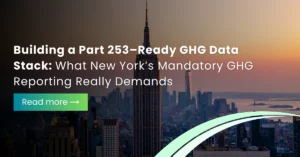Climate regulation in the United States is moving beyond fragmented,...


Make a Sustainable Impact
Get Started with SAMESG®
As we move through 2025, the need for businesses to adopt strong ESG reporting practices is more critical than ever. With over 50,000 companies in Europe now required to report under the Corporate Sustainability Reporting Directive (CSRD) and similar regulations emerging worldwide, corporate accountability is rapidly evolving.
However, many organizations face fragmented data systems, shifting regulatory requirements, and complex reporting frameworks. The solution lies in adopting an advanced ESG reporting software.
Here are the top 5 reasons why your business should consider implementing the best ESG reporting software in 2025:
The global regulatory environment for ESG reporting is becoming increasingly intricate. For instance, the CSRD mandates detailed disclosures on environmental and social impacts, affecting a vast number of companies across Europe. Simultaneously, the U.S. Securities and Exchange Commission (SEC) has introduced climate disclosure rules requiring companies to report on material climate-related risks.
Keeping abreast of these evolving regulations manually is time-consuming and prone to errors. Advanced ESG reporting software can automate compliance processes, ensuring your business stays aligned with international standards and avoids potential legal pitfalls.
ESG data is often scattered across different departments, from HR to supply chain management, creating a fragmented view of sustainability performance. In fact, a recent study revealed that 24% of companies see these internal silos as major obstacles to effectively advancing their ESG initiatives. Breaking down these barriers is essential for creating a unified, strategic approach to ESG reporting.
Implementing sustainability reporting software facilitates the consolidation of quantitative and qualitative ESG data from diverse sources. This centralization enhances data accuracy, streamlines reporting processes, and provides a holistic view of your organization’s ESG performance.
For businesses operating across multiple regions or subsidiaries, ESG reporting can become a complex endeavor. Each entity may have distinct reporting requirements, making consolidated reporting challenging.
The best ESG reporting software offers advanced organizational hierarchy management. This feature enables businesses to capture and report ESG data across various entities, departments, and business units, ensuring consistency and compliance across the board.
Stakeholders are increasingly scrutinizing not just a company’s direct operations but also its entire value chain. This includes indirect emissions, known as Scope 3 emissions, which often constitute a significant portion of a company’s carbon footprint.
Comprehensive ESG reporting tools allow businesses to conduct in-depth assessments of their supply chains, collect vendor data, and calculate Scope 3 emissions across Tier 1 and Tier 2 suppliers. This capability is crucial for identifying ESG risks and implementing sustainable practices throughout the value chain.
Double materiality is gaining momentum as companies realize the importance of understanding how ESG factors affect their business and how their operations impact the environment and society. This dual approach allows organizations to make more informed, responsible decisions that benefit their performance and the planet.
The best sustainability reporting software includes built-in double materiality assessment tools. These tools enable businesses to evaluate and prioritize ESG issues that are most significant to their operations and stakeholders, facilitating informed strategic decisions.
In a world driven by digital transformation, relying on spreadsheets and manual processes for ESG reporting is risky. Manual ESG tracking introduces a high margin of error, lacks auditability, and often results in inconsistent, non-compliant disclosures.
A 2024 survey revealed that almost 60% of companies continue to rely on Excel for managing ESG data, even as regulatory demands grow more complex and stringent. These organizations face challenges in:
Modern sustainability reporting software offers automated workflows, built-in validation rules, and dynamic dashboards that eliminate these risks. It enables teams to collaborate securely across departments, ensures traceability, and makes ESG reporting scalable and audit ready.
By transitioning to the best ESG reporting software, businesses can streamline compliance and create strategic value, transforming ESG data from a reporting burden into a catalyst for innovation and growth.
In 2025 and beyond, ESG reporting transcends mere compliance; it becomes a strategic asset. Investing in the best ESG reporting software equips your business to navigate regulatory complexities, centralize critical data, manage multi-entity reporting, assess comprehensive value chains, and make informed strategic decisions.
Platforms like SAMESG® offer features such as easy data consolidation, advanced organizational hierarchy management, comprehensive value chain assessment, global standards alignment, flexible data integration options, AI/ML-driven data capture, and built-in double materiality assessments. These capabilities ensure your organization remains agile, compliant, and ahead in the sustainability curve.
Embracing sophisticated ESG reporting software is not just about meeting today’s requirements but about future-proofing your business for the evolving demands of stakeholders and the planet.
Share
Related Posts
Explore more resources